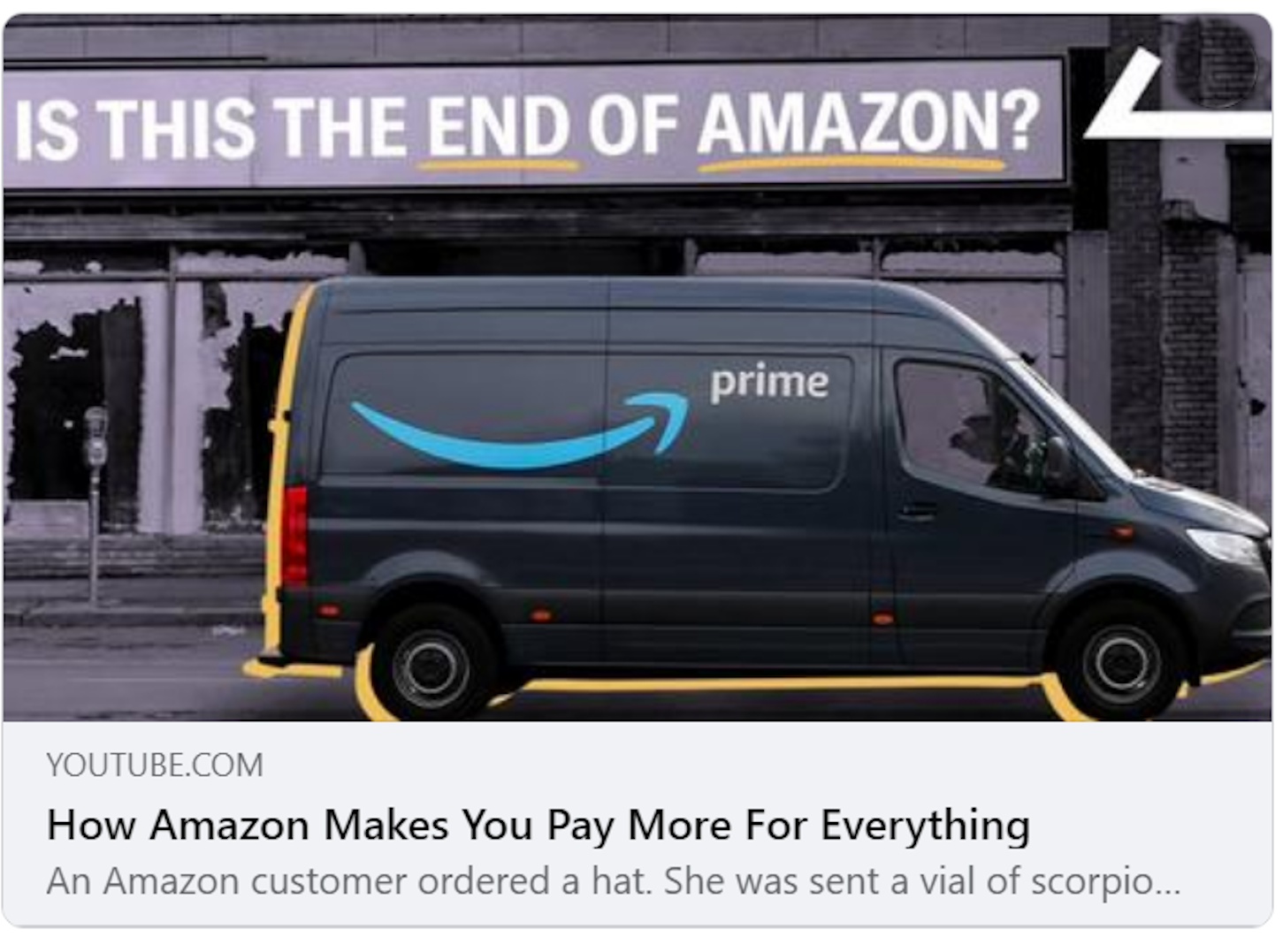The Scorpion Venom Incident:
It was supposed to be a light-hearted prank—a set of fun hats for a sauna session with friends. Instead, it turned into a bizarre and alarming experience involving scorpion venom and a harsh revelation about Amazon's monopolistic grip on online commerce. A few years ago, a group of friends, including the author, decided to enhance their sauna experience with novelty hats. A quick search on Amazon Marketplace led to a purchase from a seller named "Russian Bear," offering hats emblazoned with an oil rig and the word “oligarch” in Cyrillic. However, the package that arrived was not what was expected. Instead of hats, it contained a vial of Vidatox, a Cuban cancer drug made from Blue Scorpion venom and illegal in the U.S. This strange and potentially dangerous mix-up highlighted a much deeper issue within Amazon's chaotic marketplace.
See Video How Amazon Makes You Pay More For Everything
The Wild West of Amazon Marketplace
The incident with the scorpion venom was more than just a bizarre mix-up; it was a symptom of a much larger problem. The chaos on Amazon Marketplace isn't just a result of poor management—it's a strategic choice that benefits Amazon at the expense of consumers and sellers. Stacy Mitchell, co-executive director of the Institute for Local Self-Reliance, explained that Amazon's marketplace has become increasingly chaotic because the company faces little to no competition. This lack of competition allows Amazon to operate without the pressure to improve its platform, leading to a degraded user experience and an environment that undermines legitimate businesses. This chaos, far from being a sign of neglect, is a calculated move to destabilize and control the market.
Amazon's Squeeze on Sellers
A deeper investigation into Amazon's practices reveals a pattern of exploitation that goes beyond just a chaotic marketplace. Amazon leverages its dominant position to squeeze third-party sellers, forcing them to comply with stringent and costly requirements. Sellers who want to be competitive on Amazon must aim for the coveted Buy Box and Prime eligibility, both of which come with significant costs. Amazon's Buy Box, the prominent "Buy Now" button, is a critical feature for sellers. However, Amazon removes this option if the seller offers their product at a lower price elsewhere on the internet, forcing them to inflate their prices across all platforms. This practice not only keeps prices high for consumers but also ensures that Amazon appears to have the lowest prices by default.
The Heavy Price of Prime Eligibility
Prime eligibility is another tool Amazon uses to exert control over sellers. To qualify, sellers must use Amazon's Fulfilment by Amazon (FBA) service, which involves storing inventory in Amazon warehouses and using Amazon's delivery services. This service comes with high fees, adding to the already hefty transaction costs sellers pay to list their products on Amazon. Nicholas Parks, who runs Snob Foods, highlights how essential Prime eligibility is for visibility and sales, despite the significant costs involved. Without Prime, sellers struggle to appear in search results, making it almost impossible to compete.
A Monopoly in Online Commerce
The Federal Trade Commission's (FTC) lawsuit against Amazon highlights the extent of the company's monopolistic practices. The lawsuit alleges that Amazon uses its dominance to inflate prices, degrade services, and stifle competition. Sellers pay an increasing share of their revenue to Amazon—now nearly 50%, effectively a massive tax that inflates consumer prices. Amazon's logistics and advertising services further entrench its position, making it difficult for sellers to operate independently or on competing platforms.
The Impact on Sellers and Consumers
The financial burden on sellers is staggering. In addition to the high fees for listing products and fulfilling orders, Amazon’s advertising costs have skyrocketed. To maintain visibility, sellers must invest in Amazon's advertising services, often outbidding competitors for prime placement. This additional expense further squeezes their margins, making it difficult to sustain a profitable business. Nicholas Parks describes this dynamic as a form of economic indentured servitude, where sellers are perpetually bound to Amazon's ecosystem, unable to escape its financial demands.
For consumers, the consequences are equally dire. The chaotic marketplace, flooded with low-quality and counterfeit goods, makes it challenging to discern trustworthy products. The dominance of paid advertisements means that authentic, high-quality items are often buried under a pile of sponsored listings. This degradation of the shopping experience erodes consumer trust and limits access to genuinely good products. The illusion of low prices on Amazon is maintained by artificially inflating competitors' prices, ensuring that consumers have fewer choices and pay more regardless of where they shop.
The Broader Economic Consequences
Amazon's monopolistic practices have far-reaching implications for the broader economy. By squeezing sellers and stifling competition, Amazon is effectively creating an environment where innovation and entrepreneurship are stifled. Small businesses and new entrants find it increasingly difficult to compete, leading to reduced diversity in the marketplace. This concentration of economic power in the hands of a single entity poses a significant threat to economic dynamism and resilience. The ripple effects extend beyond e-commerce, influencing manufacturing, logistics, and retail sectors globally.
Moreover, Amazon's control over data and market access gives it an unparalleled advantage in negotiating terms with suppliers and partners. This imbalance further entrenches its market position, making it nearly impossible for other businesses to challenge its dominance. The result is a self-perpetuating cycle of dependency, where Amazon's growth and power continue to expand at the expense of everyone else in the ecosystem.
The Role of Antitrust Laws and Potential Remedies
The FTC lawsuit represents a crucial step in addressing Amazon's monopolistic behaviour. Antitrust laws are designed to prevent precisely this kind of market domination and to promote fair competition. If successful, the lawsuit could lead to significant penalties for Amazon, including a fine of up to $44 billion. More importantly, it could result in structural changes to Amazon's business practices, such as breaking up the company into smaller entities. This would be a monumental shift, potentially restoring competitive dynamics to the marketplace and providing relief to beleaguered sellers and consumers. The prospect of dismantling Amazon's monopoly is daunting but necessary. It would reintroduce competition, lower prices, and improve the overall quality of products and services available to consumers. For sellers, it would mean a fairer playing field, where success is determined by the quality of their products and services rather than their ability to navigate Amazon's oppressive demands.
A Call to Action
Amazon's unchecked growth and monopolistic practices have created a market environment that is detrimental to consumers, sellers, and the broader economy. The scorpion venom incident is just one of many examples of the chaos and exploitation that define Amazon's marketplace. As a society, it is crucial to recognize the dangers posed by such concentrated power and to take decisive action to address them.
Antitrust laws exist to prevent precisely this kind of market domination, and their enforcement is long overdue. Breaking up Amazon and reintroducing competition into the marketplace is not just a legal necessity but a moral imperative. It is time to stand up to this privately run authoritarian government masquerading as a corporation and reclaim the principles of fair competition and economic justice. If you can't beat 'em, and you can't join 'em, you got to break 'em up.


